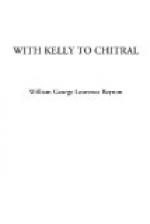CHAPTER III
THE SHANDUR PASS
Shortly after leaving Pingal, the character of the country changed considerably, and instead of a continual alternation of cliff and river bed, the valley became more open and level; we were, in fact, nearing the upper end of the valley. Beyond Cheshi the road leads up a bluff and down the other side on to the bed of the Pandur Lake. This lake had, at the beginning of 1894, been a sheet of water some four and a half miles long, but, the dam at its end having given way in July, it had drained off rapidly; and when I had crossed it in November of the same year, the mud of its bed was only just becoming firm and was cracked and fissured in every direction. It was now covered with a sheet of snow, through which the river twined dark and muddy.
We had now reached the snow line, and our green goggles were taken into use. The march of our column churned the snow and mud into a greasy slime, and the going was very tiring. However, we came in sight of the Ghizr post by 2 P.M., and Gough, of the 2nd Gurkhas, who was in command, came out to meet us. From him we learned that none of his messengers that had been sent to Mastuj with letters had returned, and it was now some ten days since the last communication had reached him; so it became evident that the enemy were between Laspur and Mastuj. We knew that they had not crossed the pass, or we should have seen them before this, so we were pretty hopeful of a fight soon after crossing the pass, and we were not disappointed. At Ghizr we also found Oldham, a Sapper subaltern, who had preceded us by a few days. He had with him a party of Kashmir Sappers and Miners, who were now armed with Snider carbines. The post, which consisted of a block of isolated houses, had been fortified and surrounded with a thorn zareba, and was only sufficiently large for the garrison of Kashmir troops then holding it, so our men were billeted in the neighbouring houses, one of which we turned into a mess and quarters for ourselves.
We halted on the 30th March, in order to allow the second detachment of the Pioneers and the guns to come up, as from here Colonel Kelly intended to march in one column. Here also we picked up the Hunza and Nagar Levies, numbering a hundred men, under their own leaders. They were posted in the village of Teru, some four miles up the valley, and from there could give timely warning if any hostile force crossed the pass. Wazir Humayun led the Hunza crowd, and Wazir Taifu the Nagar. I got to know Humayun very well indeed, and a right good sort he is. He had formerly lived for some five years in Chitral, when Raja Safdar Ali Khan of Hunza had made things too hot for him, but when Safdar Ali fled when we took the country in 1891-92, he was reinstated. Wazir Taifu I did not get to know so well, as the Nagar Levies were left behind at Mastuj, when we went on from there to Chitral. The second detachment under Peterson, and the guns with Stewart, got into camp some time after midday on the 31st March.




